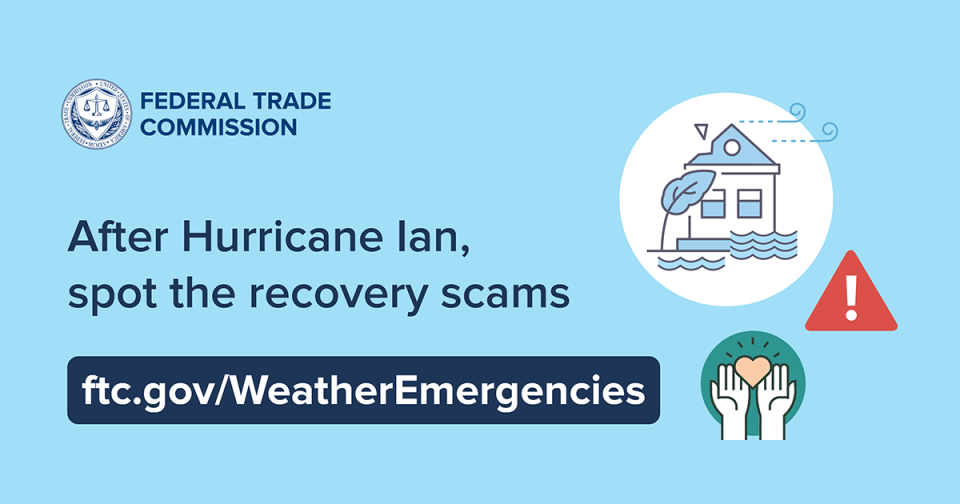Nobody knows how long it’ll take to recover from the destruction Hurricane Ian left behind. But we do know it won’t be long before scammers start trying to cash in on the deadly storm. Whether you’re getting back on your feet or looking for ways to help people in areas hit hardest, learn how scammers operate — and how to avoid them.
Here are a few ways that scammers might try to take your money or personal information after a weather emergency:
- Spot imposter scams. Scammers might pretend to be safety inspectors, government officials trying to help you, or utility workers who say immediate work is required. Don’t give them money, and ask for identification to verify who you are dealing with — before sharing personal information like your Social Security or account numbers.
- Spot FEMA impersonators charging application fees. If someone wants money to help you qualify for FEMA funds, it’s a scam. Download the FEMA Mobile App to get alerts and information.
- Spot home improvement and debris removal scams. Unlicensed contractors and scammers may appear in recovery zones with promises of quick repairs or clean-up services. Walk away if they demand cash payments up front, or refuse to give you copies of their license, insurance, and a contract in writing.
- Spot rental listing scams. Scammers know people need a place to live while they rebuild. They’ll advertise rentals that don’t exist to get your money and run. The scammers are the ones who tell you to wire money, or who ask for security deposits or rent before you’ve met or signed a lease.
- Spot charity scams. Scammers will often try to profit from the misfortune of others, sometimes using familiar-sounding names or logos. Check Donating Wisely and Avoiding Charity Scams before opening up your wallet.
Learn more at ftc.gov/WeatherEmergencies and report weather-related scams to the FTC at ReportFraud.ftc.gov.


Thx so very much for the warnings and info you provide. Invaluable information which will go a long was toward protecting us from being scammed.
I had a person call me yesterday saying that my new Medicare card will be black and white..they wanted my member ID number and etc
So was this a scam ?
In reply to I had a person call me… by Brenda
That sounds like a scam. If a scammer gets your Medicare ID and other information, they can get medical services in your name, or commit identity theft. If anyone calls and asks for your Medicare number, hang up and call the real Medicare at 1-800-MEDICARE.
The Medicare website says Medicare will never call you uninvited and ask for personal or private information.
Thanks for the warnings about scams after Hurricane Ian. Suggestion: Call several TV networks so your warnings can benefit more people.
I have been scammed recently and i have filed a report with a number of scam recovery companies. A few days later i got a call informing me that my money has been recovered i should open a flash wallet. I opened one where they deposited the money but the problem is i have been told to deposit a huge amount of money in the flash wallet to activate it before the withdrawal then i dont know if its another scam or what.